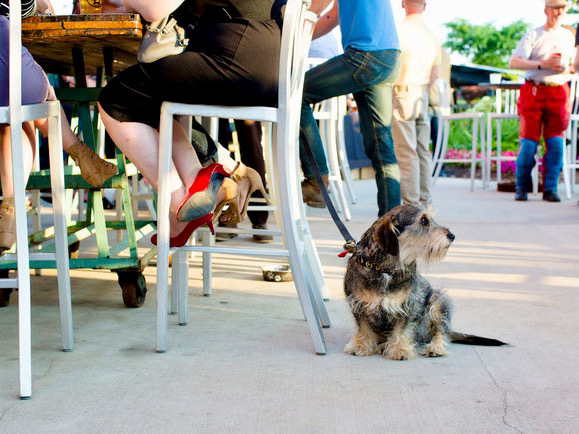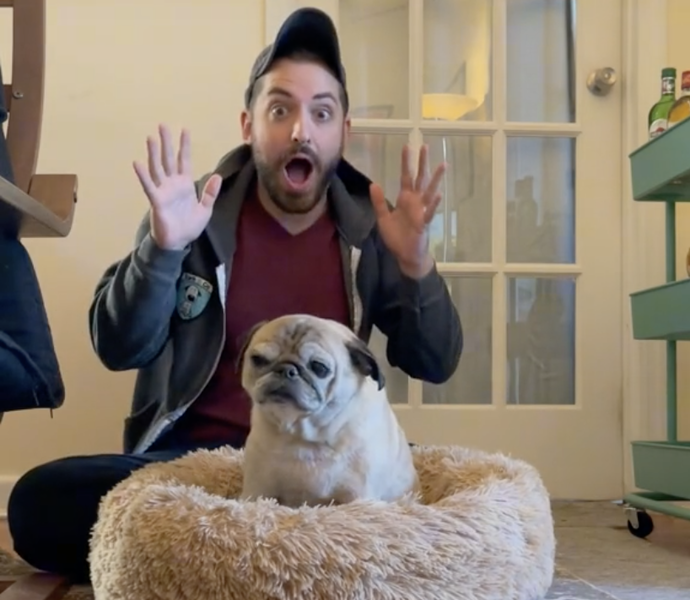More and more people are able to take their pooch to work thanks to the rise of dog-friendly offices, but few folks actually work with their pets.
Christina Marshall does.
Marshall has worked for the Milwaukee Police Department for 17 years, and 7 years ago she joined the K9 unit and partnered up with a German shepherd named Kenny. Today, Kenny serves as both her partner on the job and her family's beloved pet.
Every morning, when Marshall gets dressed for the day, Kenny sniffs her pants and determines if she is wearing her "work pants" or her "play pants." If Marshall is wearing her uniform pants, Kenny knows he is about to go to work and sticks to her side during the remainder of her morning routines. If she puts on a pair of casual pants, Kenny resumes his duties as the family pet.
A lot of police dogs, including Kenny, are brought to the United States from Germany and arrive trained, for the most part. Marshall spent about a month training with Kenny when the two were paired, figuring out what he knew and what he still needed to learn. He continues to train, on the job and off, every day.
Marshall grew up on the North Side of Milwaukee, served as a police officer in the National Guard and attended Milwaukee Area Technical College (MATC) where she received a degree in criminal justice. Today she lives on the South Side with her husband, who is a police sergeant, their two children and Kenny, as well as another dog, a female rottweiler who does not work for the police.
"Kenny is very different at home. He’s not as dominant – our female dog is in charge," says Marshall. "He’s very sweet to the kids. He sleeps in my daughter’s room every night."
Kenny is trained to find drugs, guns, bullets and people. He will scratch, bark or lay down and stare to alert Marshall when he has located something or someone. When Kenny is successful, he is rewarded with his "giftie" which is a rolled-up towel. If he is particularly helpful, he will receive a freeze-dried treat.
About eight years ago, Marshall says she watched a television show about service dogs and was so impressed with their capabilities that she spoke to her sergeant about them who later invited her to a K9 training.
The Milwaukee Police Department has seven tri-purpose dogs like Kenny – trained to find drugs, people and fire arms – as well as three narcotics dogs and one bomb dog. The dogs are often German shepherds, but sometimes Labradors, and all of the dogs are males.
Police dogs are extremely valuable to officers because of their heightened senses, speed, bravery and strength. Often times, a suspect will be more afraid of the dog than the officer and will surrender.
"Dogs prevent officers – and suspects – from getting hurt," says Marshall.
They also help police officers – who are often in stressful, adrenaline-raising situations – to feel less anxiety.
"At any moment, someone could jump out or come from around the corner and the dog will know this before the officer, which makes us feel a little better," says Marshall.
Kenny has had many "glory moments" according to Marshall. He is very good at finding guns after someone tosses them.
"Every time Kenny retrieves a gun it’s one less gun on the streets," says Marshall.
He also sniffed out 84 pounds of pot that was being stored in garage coolers. When Kenny first started scratching at the coolers, Marshall thought he was responding to the smell of meat and was perturbed with him at first.
She then realized instead of brats and hot dogs that the coolers were packed with pot and so instead of a scolding, Kenny got his giftie.
Marshall shares her police car with Kenny every shift. The vehicle is retrofitted with tinted windows and a temperature control device. If the car gets hotter than 85 degrees, the windows automatically roll down and Marshall gets a page alerting her that the car is too hot for the dog.
All of Kenny’s food is donated by Fromm Family Foods. The 115-year-old local company will continue to provide food for Kenny for his entire life, even after he is retired.
Police dogs work until they become too old or sick to perform. Sometimes, the police department will hold a ceremony for a dog who passes.
Aside from the dogs’ ability to contribute to police work, they add a lot of warmth and happiness in the office.
"People just love to have him around. We’re all really proud of him," says Marshall. "I see it as the opportunity of a lifetime: to live, play and work with my dog."
Molly Snyder started writing and publishing her work at the age 10, when her community newspaper printed her poem, "The Unicorn.” Since then, she's expanded beyond the subject of mythical creatures and written in many different mediums but, nearest and dearest to her heart, thousands of articles for OnMilwaukee.
Molly is a regular contributor to FOX6 News and numerous radio stations as well as the co-host of "Dandelions: A Podcast For Women.” She's received five Milwaukee Press Club Awards, served as the Pfister Narrator and is the Wisconsin State Fair’s Celebrity Cream Puff Eating Champion of 2019.







